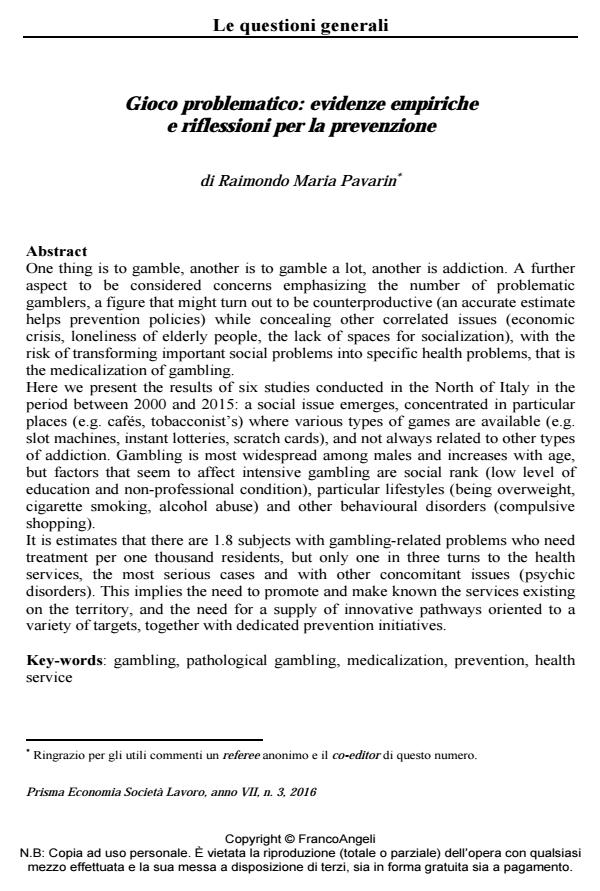Gioco problematico: evidenze empiriche e riflessioni per la prevenzione
Titolo Rivista PRISMA Economia - Società - Lavoro
Autori/Curatori Raimondo Maria Pavarin
Anno di pubblicazione 2018 Fascicolo 2016/3
Lingua Italiano Numero pagine 25 P. 16-40 Dimensione file 343 KB
DOI 10.3280/PRI2016-003003
Il DOI è il codice a barre della proprietà intellettuale: per saperne di più
clicca qui
Qui sotto puoi vedere in anteprima la prima pagina di questo articolo.
Se questo articolo ti interessa, lo puoi acquistare (e scaricare in formato pdf) seguendo le facili indicazioni per acquistare il download credit. Acquista Download Credits per scaricare questo Articolo in formato PDF

FrancoAngeli è membro della Publishers International Linking Association, Inc (PILA)associazione indipendente e non profit per facilitare (attraverso i servizi tecnologici implementati da CrossRef.org) l’accesso degli studiosi ai contenuti digitali nelle pubblicazioni professionali e scientifiche
One thing is to gamble, another is to gamble a lot, another is addiction. A further aspect to be considered concerns emphasizing the number of problematic gamblers, a figure that might turn out to be counterproductive (an accurate estimate helps prevention policies) while concealing other correlated issues (economic crisis, loneliness of elderly people, the lack of spaces for socialization), with the risk of transforming important social problems into specific health problems, that is the medicalization of gambling. Here we present the results of six studies conducted in the North of Italy in the period between 2000 and 2015: a social issue emerges, concentrated in particular places (e.g. cafés, tobacconist’s) where various types of games are available (e.g. slot machines, instant lotteries, scratch cards), and not always related to other types of addiction. Gambling is most widespread among males and increases with age, but factors that seem to affect intensive gambling are social rank (low level of education and non-professional condition), particular lifestyles (being overweight, cigarette smoking, alcohol abuse) and other behavioural disorders (compulsive shopping). It is estimates that there are 1.8 subjects with gambling-related problems who need treatment per one thousand residents, but only one in three turns to the health services, the most serious cases and with other concomitant issues (psychic disorders). This implies the need to promote and make known the services existing on the territory, and the need for a supply of innovative pathways oriented to a variety of targets, together with dedicated prevention initiatives.
Parole chiave:Gambling, pathological gambling, medicalization, prevention, health service
- Il Servizio Ausl di Bologna per il Disturbo del Gioco d'Azzardo (DGA) Chiara Persichella, Roberta Agusto, Simonette Sermi, Teresa Testigrosso, Raffaella Campalastri, in SICUREZZA E SCIENZE SOCIALI 1/2022 pp.107
DOI: 10.3280/SISS2022-001009
Raimondo Maria Pavarin, Gioco problematico: evidenze empiriche e riflessioni per la prevenzione in "PRISMA Economia - Società - Lavoro" 3/2016, pp 16-40, DOI: 10.3280/PRI2016-003003